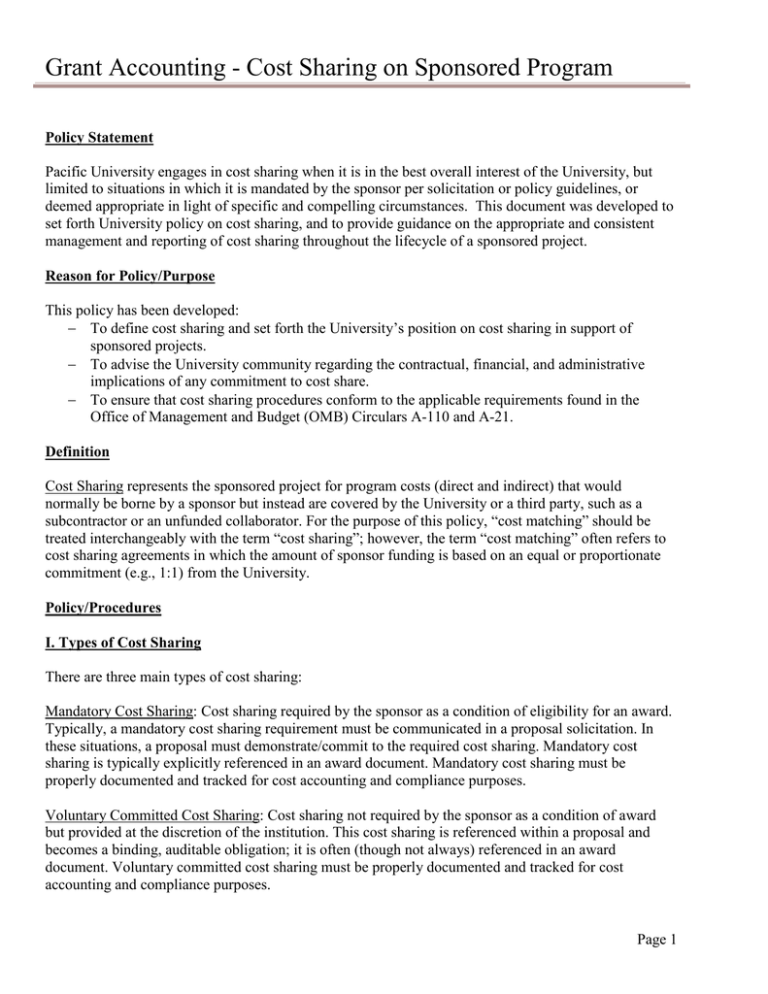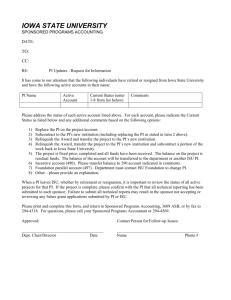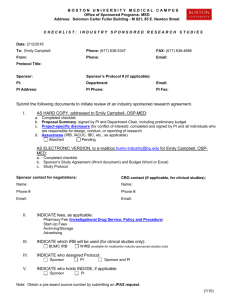Grant Accounting - Cost Sharing on Sponsored Program
advertisement

Grant Accounting - Cost Sharing on Sponsored Program Policy Statement Pacific University engages in cost sharing when it is in the best overall interest of the University, but limited to situations in which it is mandated by the sponsor per solicitation or policy guidelines, or deemed appropriate in light of specific and compelling circumstances. This document was developed to set forth University policy on cost sharing, and to provide guidance on the appropriate and consistent management and reporting of cost sharing throughout the lifecycle of a sponsored project. Reason for Policy/Purpose This policy has been developed: − To define cost sharing and set forth the University’s position on cost sharing in support of sponsored projects. − To advise the University community regarding the contractual, financial, and administrative implications of any commitment to cost share. − To ensure that cost sharing procedures conform to the applicable requirements found in the Office of Management and Budget (OMB) Circulars A-110 and A-21. Definition Cost Sharing represents the sponsored project for program costs (direct and indirect) that would normally be borne by a sponsor but instead are covered by the University or a third party, such as a subcontractor or an unfunded collaborator. For the purpose of this policy, “cost matching” should be treated interchangeably with the term “cost sharing”; however, the term “cost matching” often refers to cost sharing agreements in which the amount of sponsor funding is based on an equal or proportionate commitment (e.g., 1:1) from the University. Policy/Procedures I. Types of Cost Sharing There are three main types of cost sharing: Mandatory Cost Sharing: Cost sharing required by the sponsor as a condition of eligibility for an award. Typically, a mandatory cost sharing requirement must be communicated in a proposal solicitation. In these situations, a proposal must demonstrate/commit to the required cost sharing. Mandatory cost sharing is typically explicitly referenced in an award document. Mandatory cost sharing must be properly documented and tracked for cost accounting and compliance purposes. Voluntary Committed Cost Sharing: Cost sharing not required by the sponsor as a condition of award but provided at the discretion of the institution. This cost sharing is referenced within a proposal and becomes a binding, auditable obligation; it is often (though not always) referenced in an award document. Voluntary committed cost sharing must be properly documented and tracked for cost accounting and compliance purposes. Page 1 Voluntary Uncommitted Cost Sharing: Cost sharing not required by the relevant program solicitation, not referenced in the proposal or award, and not formally tracked (or auditable). The most common form of voluntary uncommitted cost sharing is faculty or researcher effort additional to the level of effort originally committed to the sponsored project. II. Pacific University’s Position on Cost Sharing Pacific University would engage in cost sharing if it is in the best overall interest of the University, but limited to situations in which it is mandated by the sponsor per solicitation or policy guidelines, or deemed appropriate in light of specific and compelling circumstances. Pacific University does not typically cost share on a voluntary basis, consistent with its objective of maximizing sponsor cost reimbursement to support the continued growth of the research enterprise. A voluntary cost sharing commitment should be made only when the competitive forces and perceived institutional benefit of receiving the award are deemed to be sufficiently strong to warrant the commitment. Cost sharing enables Pacific to be eligible and competitive for some of the most prestigious, the most scientifically important, and the most collaborative projects that we undertake. Cost sharing represents an investment that helps Pacific fulfill its mission as a research institution. However, cost sharing represents an administratively complex and high-risk business objective. Cost sharing also increases the audit risk of a sponsored project. III. Impacts of Cost Sharing Financial Impact: Cost sharing can redirect resources from departments, schools, and/or central units, limiting those units’ capabilities. The inherent forfeiture of indirect costs produced by cost sharing represents a further University subsidy. That is, the University loses the ability to accrue indirect costs on project expenses that were cost shared as opposed to charged to a sponsored project. Administrative Impact: Cost sharing presented in a proposal becomes a biding obligation at the award stage that the University must monitor, document, and report on. This represents a significant organizational administrative burden across many units and management levels at the University. Investigator Impact: In situations where faculty effort is cost shared in support of a mandatory or voluntary committed cost sharing requirement, faculty members’ ability to conduct other research may be limited. Investigators can also be affected by the burden to monitor, document, and report committed cost sharing. Compliance Impact: In general, cost sharing increases the compliance risk of a sponsored project. Cost sharing increases the University’s audit exposure, and any audit findings determining that cost sharing did not occur or did not occur to the committed level could result in consequences including, but not limited to, disallowance of costs and termination of award. F&A Rate Impact: The University’s total amount of mandatory and voluntary committed cost sharing (salary and non-salary) must be included in the direct cost base for calculating the F&A rate for Organized Research. IV. Forms of Cost Sharing All cost sharing contributions (including those from third party sources) must meet the guidelines set forth in OMB Circulars A-21 and A-110 to be considered allowable cost sharing on a sponsored project. Page 2 If a cost does not meet the appropriate criteria to be an allowable cost on a sponsored project, it cannot be considered a cost share contribution. Cash: Cash contributions used to cost share must come from an allowable, non-sponsored source, such as appropriated, gift, endowed, or discretionary accounts. Cash can be used to fund salaries, fringe benefits, travel, equipment, supplies, and other allowable direct costs as defined by OMB Circulars A-21 and A-110. Effort: An effort commitment is the portion of time committed to a particular sponsored project in relation to an individual’s total activities at the institution. This commitment represents a contractual obligation to a sponsored project, whether the effort is charged or cost shared to the project. When an investigator makes an effort commitment to a sponsored project without requesting the associated salary, the investigator is establishing a cost share commitment, as the University is assuming from the sponsor the cost of the investigator’s project time (inclusive of salaries and fringe benefits). Cost sharing effort can occur either at the proposal stage as a commitment or at the award stage as a previously uncommitted but quantifiable contribution to the project. Salary Cap Cost Sharing is also related to effort. This is cost sharing occurring when the base salary paid to an individual is in excess of a sponsor-designated limit, usually applicable to a particular federal fiscal year. Unrecovered F&A: Facilities & Administrative costs (F&A or indirect costs) are real costs associated with conducting sponsored activity. In situations where allowable direct costs are cost shared, the F&A associated with these direct costs cannot be assessed, but still represent a quantifiable loss and should be considered cost sharing. In situations where indirect costs are limited by the sponsor (based on a flat amount or lower F&A rate cap), the difference between that sponsored activity’s institutionallydesignated rate and the sponsor’s limit/cap may be considered cost sharing. The University’s intention to count unrecovered indirect costs as cost sharing should be presented to the sponsor in the proposal; prior approval to count this kind of cost sharing may otherwise be required. Third-Party: Third party contributions represent cost sharing provided by an entity external to the University. Third-party cost shared commitments and expenditures must follow the same guidelines that the University follows in order for them to be considered allowable and appropriate cost sharing. Examples include sub-awardee cost sharing, donated equipment, and contributed time or services from an extramural party. Related Information OMB Circular A-110 (Uniform Administrative Requirements for Grants and Agreements with Institutions of Higher Education, Hospitals, and Other Non-Profit Organizations) OMB Circular A-21 (Cost Principles for Educational Institutions) Page 3







